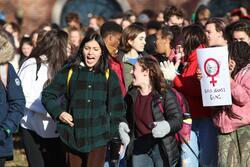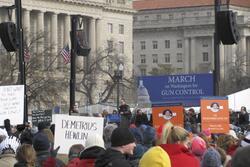Privilege after Parkland
When my best friend texted me on February 14, 2018 that his school had been shot up, I couldn’t believe what he’d said. It wasn’t that I was shocked; I was just sure he was mistaken. The things that horrify the nation, the world, the things that occupy headlines for weeks on end, the things that can’t be forgotten; those things don’t happen in my South Florida community. A mass shooting at a high school barely 30 miles away from me? I felt incredulous at what I perceived to be a sick joke. In my mind flashed dozens of terms describing Marjory Stoneman Douglas High School (MSD) in Parkland, Florida (“AP classes,” “Jewish,” “speech and debate,” “wealthy”) but not one of them was “dangerous,” or “susceptible to violence.” Traits I associate with the student body at MSD can easily be applied to my school. A needle popped the warm bubble of my South Florida life, a life full of affluence and overwhelming suburban safety. That instant sickness I felt, a mixture of grief and fear, would be the first time in the months following the shooting at Marjory Stoneman Douglas High School that I saw my own privilege with clarity.
Privilege is a loaded term, one commonly heard behind adjectives like “white” or “male”; yet, it's a word that should not only be limited to factors of race or gender. Affecting everything from our schooling to our housing to our diet, privilege is present for everyone in varied ways. I am privileged to be part of an upper-middle class community. My upbringing in this environment allowed me to explore my Judaism through costly experiences, like summer camp and trips to Israel. For me, though, Judaism most importantly includes taking part in a culture that prioritizes education and activism. My sorrow, rage, and inescapable call to act as a result of the Parkland shooting was thus prompted by my Jewish beliefs.
The combined efforts of thousands of teens mobilized a movement against gun violence in response to the shooting; however, privileges my fellow activists and I shared (including our general whiteness, our general affluence, and our residency in a politically and economically important region) allowed us to mobilize in ways other anti-gun violence protesters could not. When it was our time to talk, people listened. But capturing the attention of a jaded nation happened through unseen privileges, advantages I didn’t realize or acknowledge at the start of the movement. The ability to participate in politics is a privilege often overlooked. As a Jew, I'm surrounded with rhetoric that praises action and advocacy (“If not now, when?”). But how are my choices that are motivated by my upbringing also enabled by my socioeconomic class?
In the weeks following the shooting, my school buzzed with anticipation of something great. I heard whispers here and there of a school day walkout, a grand protest in the face of our school administration, with anger directed at state administration who had, through ineffectual leadership, set up our peers in Parkland to suffer injustice. Less than two weeks after the Parkland shooting, we did march, walking the half mile from school to the West Palm Beach City Hall. And there was one privilege supporting the whole protest: our principal gave us permission to march, excusing absences on February 23.
To me and so many others, it was only just that our righteous anger be expressed, and only just that our principal let us walk. As we flooded social media with our senator’s phone numbers and statistics of skyrocketing gun violence rates, we looked down upon other schools and even students at our own school who wouldn’t march. To me then, activism was a matter of would, not could. Our principal and administration supported us fully, opening the gates for us around lunchtime, and welcoming us back before the buses departed a few hours later.
I don’t discredit the march itself; its healing power for our disheartened student body was unlike anything I have felt before or since. I stood in front of the assembly that afternoon and spoke about my guilt, my dreams, and how it felt to be so close to a tragedy that I had not directly experienced. I felt even then that I was incredibly lucky, not just to have a platform and the support of my community, but to have been there in the first place. How many other teenagers around the state of Florida, around the country, shared my bitterness and anger, but didn’t have the tools to be where I was then? How many were missing the support of faculty, the support of a like-minded, liberal community, the support of a lifetime raised in a synagogue where historical rebels and uprisings were studied and praised? How many didn’t have the assurance that they could miss a day of school and catch up? How many couldn’t guarantee marching permission from parents or guardians? I’ve grappled with these questions over the past year, and as I’ve grown as an activist, I’ve realized that privilege should never be ignored. The true power residing in privilege is the ability to provide access for others, raising one’s peers to the status that one is involuntarily entitled to.
If my privilege allows me national attention and credibility, then I have an obligation to extend my influence and enable others to create change. Protesting is more than bodies moving, more than signage, and more than social media posts, though these are all aids for marching. Protesting requires demands and dedication, not half-hearted commitment by individuals with little at stake in an issue. In activism and in life, it’s crucial to recognize when one has few stakes in a situation, and even more important to use one's advantage to amplify others. If someone has the privilege of using their voice to enact change, then that person can do good by listening and by enabling others to take on that role and enact justice for themselves.
Undeniably, there is power in protest; I’ve hardly ever felt more powerful than I did standing at the podium during the climax of the march, the crowd cheering me on in support as I delivered my speech. However, there is more power, especially from a Jewish perspective, in broadening the access that others have to protest. As Hillel said, “If I am only for myself, who am I?”
This piece was written as part of JWA’s Rising Voices Fellowship.






I remember feeling the same exact way. Beautifully written!
This is amazing!